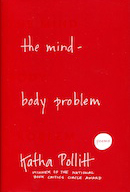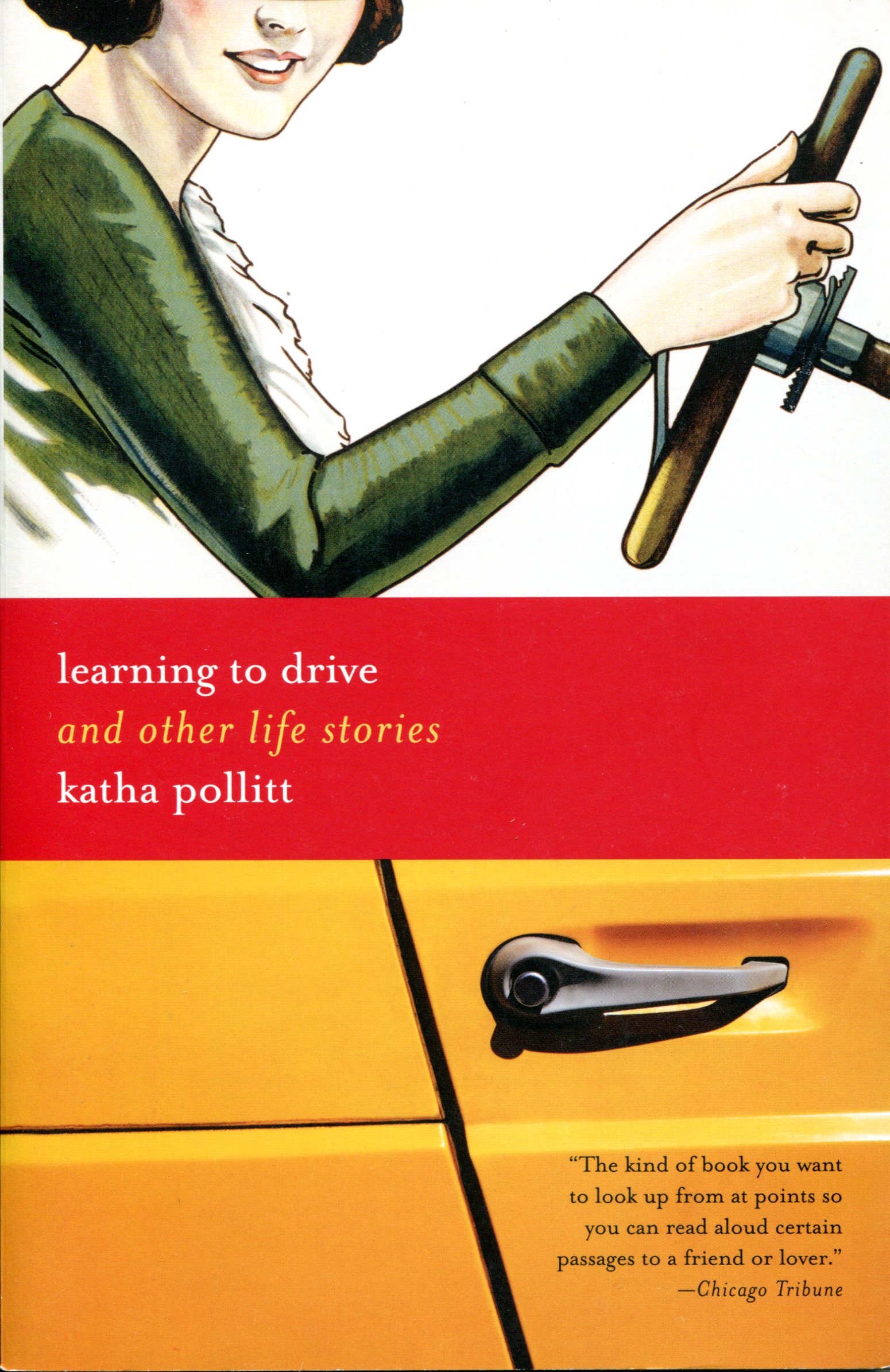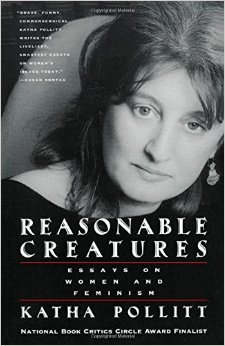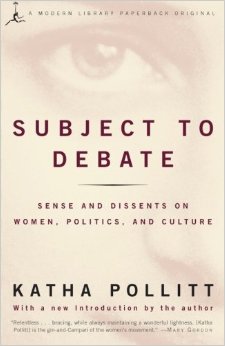

Katha Pollitt
Acclaimed Poet & Columnist
National Book Critics Circle Award Winner


Readings &
Lecture Topics
- What?! It’s the 21st Century and I’m Still Not Equal?!—Women in the 21st Century
- What? It’s the 21st Century and We’re Still Fighting for Reproductive Right?
- PRO: Reclaiming Abortion Rights
- An Evening with Katha Pollitt
Biography
“Over the years, I’ve been outsourcing my thinking on a host of subjects to Katha Pollitt.” —Barbara Ehrenreich
“[Pollitt’s] intelligence is always relentless, always bracing, while always maintaining a wonderful lightness. She is the gin-and-Campari of the women’s movement.” —Mary Gordon
Celebrated for her award-winning political columns, criticism, and poetry, Katha Pollitt has won many prizes and awards for her work, including two National Magazine Awards for Essays and Criticism and the National Book Critics Circle Award for her first collection of poetry, Antarctic Traveller (1982). Her second poetry book is entitled The Mind-Body Problem (Random House, 2009). Pollitt’s column, “Subject to Debate,” in The Nation magazine, was called “the best place to go for original thinking on the left” by The Washington Post. Many of her contributions to The Nation are compiled in three books: Virginity and Death!: And Other Social and Political Issues of Out Time; Subject to Debate: Sense and Dissents on Women, Politics, and Culture (Modern Library); Reasonable Creatures: Essays on Women and Feminism (Knopf), nominated for The National Book Critics Circle Award. Pollitt was nominated for a 2013 National Magazine Award in Columns and Commentary. Before she became a regular columnist for The Nation, Pollitt edited its Books & the Arts section. Her book Learning to Drive is a poignant, hilarious, and sometimes outrageous collection of stories drawn from her own life.
Named a NY Time Notable Book of 2014, Pollitt’s Pro: Reclaiming Abortion Rights (Picador, 2014) is powerful argument for abortion as a moral right and social good. In a starred review, Publishers Weekly wrote: “An impassioned, persuasive case for understanding [abortion] in its proper context…With wit and logic, Pollitt debunks the many myths surrounding abortion, and analyzes what abortion opponents really oppose: namely, women’s growing sexual freedom and power….With arguments that are both lucid and sensible, Pollitt successfully reframes the abortion debate to show that, ‘in the end, abortion is an issue of fundamental human rights.’” An urgent, controversial book, Pollitt takes on the personhood argument and reaffirms the priority of a woman’s life and health.
Pollitt has also written essays and book reviews for The New Yorker, The Atlantic, The New Republic, Harper’s, Ms., Glamour, Mother Jones, the New York Times, and the London Review of Books. She has appeared on NPR’s Fresh Air and All Things Considered, Charlie Rose, The McLaughlin Group, CNN, Dateline NBC, and the BBC. Her work is taught in many university classes. Her 1992 essay on the culture wars, “Why We Read: Canon to the Right of Me…” won the National Magazine Award for essays and criticism, and she won a Whiting Foundation Writing Award the same year. In 1993 her essay “Why Do We Romanticize the Fetus?” won the Maggie Award from the Planned Parenthood Federation of America. The essay “Learning to Drive” is anthologized in Best American Essays 2003. As a poet, Pollitt has received a National Endowment for the Arts grant and a Guggenheim Fellowship. Her poetry has most recently been anthologized in The Oxford Book of American Poetry (2006). In 2010 she was awarded The American Book Award for Lifetime Achievement.
Born in New York City, Pollitt received an A.B. in philosophy from Radcliffe College and an M.F.A. in writing from Columbia University. Married to political theorist Steven Lukes, she lives in New York City.
Short Bio
Katha Pollitt is a poet, essayist, and columnist for The Nation. She has won many prizes and awards for her work, including two National Magazine Awards for Essays and Criticism. Pollitt is the author of Pro: Reclaiming Abortion Rights, a powerful argument for abortion as a moral right and social good; Learning to Drive and Other Life Stories, a collection of personal essays; and Virginity or Death! She is also the author of two books of poetry, Antarctic Traveller, winner of the National Book Critics Circle Award, and The Mind-Body Problem. Before she became a regular columnist for The Nation, Pollitt edited its Books & the Arts section, and she has also written essays and book reviews for The New Yorker, The Atlantic, The New Republic, Harper’s, Ms., Glamour, Mother Jones, the New York Times, and the London Review of Books. Pollitt has received a National Endowment for the Arts grant and a Guggenheim Fellowship. Her poetry has most recently been anthologized in The Oxford Book of American Poetry. In 2010 she was awarded The American Book Award for Lifetime Achievement. She lives in New York City.
Visit Author WebsiteVideos
Publications
PRO: Reclaiming Abortion Rights
2014
“[This] shouldn’t be a radical message, but in an era when some feminists feel the need to defend the birth control pill by highlighting its use for reasons other than contraception, the very idea that we should insist that abortion is a good thing because it’s good for women feels incredibly bold…. ‘No one is pro-abortion’ is a common refrain among liberals defending the right to choose. In the abstract, no, but if you need an abortion to live your life as you see fit, then pro-abortion is exactly what you are. Katha Pollitt has your back on this, and more pro-choicers should embrace her unapologetic approach.”—Ms. Magazine
A powerful argument for abortion as a moral right and social good by a noted feminist and longtime columnist for The Nation. Forty years after the landmark Roe v. Wade ruling, “abortion” is still a word that is said with outright hostility by many, despite the fact that one in three American women will have terminated at least one pregnancy by menopause. Even those who support a woman’s right to an abortion often qualify their support by saying abortion is a “bad thing,” an “agonizing decision,” making the medical procedure so remote and radioactive that it takes it out of the world of the everyday, turning an act that is normal and necessary into something shameful and secretive. Meanwhile, with each passing day, the rights upheld by the Supreme Court are being systematically eroded by state laws designed to end abortion outright. In this urgent, controversial book, Katha Pollitt reframes abortion as a common part of a woman’s reproductive life, one that should be accepted as a moral right with positive social implications. In Pro, Pollitt takes on the personhood argument, reaffirms the priority of a woman’s life and health, and discusses why terminating a pregnancy can be a force for good for women, families, and society. It is time, Pollitt argues, that we reclaim the lives and the rights of women and mothers..
The Mind-Body Problem
Poetry, 2009
“It’s awfully good to have such a great-hearted poet as Katha Pollitt take on mortality’s darkest themes. Again and again she finds a human-sized crack of light and squeezes us through with her.”—Kay Ryan
In The Mind-Body Problem, Katha Pollitt takes the ordinary events of life (her own and others) and turns them into brilliant, poignant, and often funny poems that are full of surprises and originality. Pollitt’s imagination is stirred by conflict and juxtaposition, by the contrast (but also the connection) between logic and feeling, between the real and the transcendent, between our outer and inner selves: Jane Austen slides her manuscript under her blotter, bewildered young mothers chat politely on the playground, the simple lines of a Chinese bowl in a thrift store remind the poet of the only apparent simplicities of her childhood. The title poem hilariously and ruefully depicts the friction between passion and repression (“Perhaps / my body would have liked to make some of our dates, / to come home at four in the morning and answer my scowl / with “None of your business!”). In a sequence of nine poems, Pollitt turns to the Bible for inspiration, transforming some of the oldest tales of Western civilization into subversive modern parables: What if Adam and Eve couldn’t wait to leave Eden? What if God needs us more than we need him? With these moving, vivid, and utterly distinctive poems, Katha Pollitt reminds us that poetry can be both profound and accessible, and reconfirms her standing in the first rank of modern American poets.
Learning to Drive
Stories, 2008
“A powerful personal narrative…full of insight and charm…Pollitt is her own Jane Austen character . . . haughty and modest, moral and irresponsible, sensible and, happily for us, lost in sensibility.” —New York Review of Books
Celebrated for her award-winning political columns, criticism, and poetry, Katha Pollitt offers something new in this poignant, hilarious, and sometimes outrageous collection of stories drawn from her own life. With deep feeling and sharp insight, she writes about love, sex, betrayal, heartbreak, and much more: what she learned about her parents from reading their FBI files, the joy and loneliness of new motherhood, the curious mental effects of a post-college stint proofreading pornographic novels, and the decline and fall of practically everything, including herself. Unafraid to say what others only think and acknowledge what others won’t admit, Katha Pollitt surprises and entertains on every page.
Virginity or Death!: And Other Social and Political Issues for Our Time
2006
Through presidential administrations Democratic and Republican, Katha Pollitt has observed and exposed the inconsistencies and illogic of those who stand in the way of progress solely to hold on to their power. In defense of human rights and equality, she assails the corrupt and educates the misguided with compassion, Swiftian wit, and complete literary authority. In this compelling collection, Pollitt skewers one hypocrite after another. She suggests, for example, that creationists be permitted to oppose the teaching of evolution only so long as they agree to forgo the benefits of the theory—such as flu vaccines. She gently wonders if those who denounced the decision to allow Terri Schiavo to die in peace would themselves be satisfied to be video-diagnosed by Senator Bill Frist. And in the title essay about fundamentalists’ antagonism toward sex education and STD prevention, she asks, “What is it with these right-wing Christians? Faced with a choice between sex and death, they choose death every time.” Pollitt is one of the most eloquent and persuasive voices in American political conversation of this or any other era, and Virginity or Death! Is a marvelous demonstration of her keen insight, mordant humor, and sense of justice.
Articles & Audio
Read What’s In Print
• This Season, ‘Game of Thrones’ Cut Deep (Caution, Spoiler Alert!) by Katha Pollitt – The Nation
• Katha Pollitt at NARAL on feminism and her book PRO: Reclaiming Abortion Rights
• Review of PRO: Reclaiming Abortion Rights — New York Times
• Review of PRO: Reclaiming Abortion Rights — Washington Post
• Review of PRO: Reclaiming Abortion Rights — Kirkus Reviews
• Katha Pollitt Discusses Her Poem “Lunaria” — Poetry Society of America
• Read Poems by Katha Pollitt on The Writer’s Almanac
Listen to Audio
• Interview with Terry Gross on Learning to Drive — NPR Fresh Air
Selected Writings
• Read “Brown Furniture” by Katha Pollitt – The New Yorker
PRO: RECLAIMING ABORTION RIGHTS (novel excerpt)
Abortion. We need to talk about it. I know, sometimes it seems as if we talk of little else, so perhaps I should say we need to talk about it differently. Not as something we all agree is a bad thing about which we shake our heads sadly and then debate its precise degree of badness, preening ourselves on our judiciousness and moral seriousness as we argue about this or that restriction on this or that kind of woman. We need to talk about ending a pregnancy as a common, even normal, event in the reproductive lives of women—and not just modern American women either, but women throughout history and all over the world, from ancient Egypt to medieval Catholic Europe, from today’s sprawling cities to rural villages barely touches by modern ideas about women’s roles and rights. Abortion takes place in Canada and Greece and France, where it is legal, performed by medical professionals, and covered by national health insurance, and also in Kenya, Nicaragua, and the Philippines, where it is a crime and a woman who terminates a pregnancy takes her life in her hands. According to anthropologists, abortion is found in virtually every society, going back at least 4,000 years. American women had great numbers of abortions throughout our history, when it was legal and when it was not. Consider this: At the beginning of the nineteenth century effective birth control barely existed and in the 1870s it was criminalized— even mailing an informational pamphlet about contraceptive devices was against the law and remained so until 1936. Yet the average number of births per woman declined from around 7 in 1800 to around 3.5 in 1900 to just over 2 in 1930. How do you think that happened?
HAPPINESS WRITES WHITE
So what good is it? Let’s be sad,
wear melancholy like an old brown sweater
patched at the elbows and smelling of our own funk.
The coffee cups pile up on the little table,
pages turn, electric lights come on—
it would be good to have a dog, you think,
one with grave eyes and an understanding of life,
it would be good
to go down to the docks to watch the freighters
idly listing in the oily water,
to smoke a cigarette and look out at the sea
and then walk home in the gathering evening,
at a measured pace, still hearing the voice of the sea
that speaks to you like a friend, of serious things
so simply and quietly
you barely notice the sky blanch after rain
or the woman coming out of the subway
carrying an immense bouquet of white lilac
wrapped in white tissue paper, like a torch.
—from The Mind-Body Problem
WEBSTALKER
You think what people say is what matters, an older friend told me long ago. You think it’s all about words. Well, that’s natural, isn’t it? I’m a writer; I can float for hours on a word like “amethyst” or “broom” or the way so many words sound like what they are: “earth” so firm and basic, “air” so light, like a breath. You can’t imagine them the other way around: She plunged her hands into the rich brown air. Sometimes I think I would like to be a word—not a big important word, like “love” or “truth,” just a small ordinary word, like “orange” or “inkstain”, or “so,” a word that people use so often and so unthinkingly that its specialness has all been worn away, like the roughness on a pebble in a creek bed, but that has a solid heft when you pick it up, and if you hold it to the light at just the right angle you can glimpse the spark at its core. But of course what my friend meant was that I ignored inconvenient subtexts, the meaning behind the meaning: that someone might say he loved you, but what really mattered was the way he let your hand go after he said it. It did not occur to me, either, that somebody might just lie, that there are people who lie for pleasure, for the feeling of superiority and power. And yet it should have.
—from Learning to Drive and Other Life Stories






